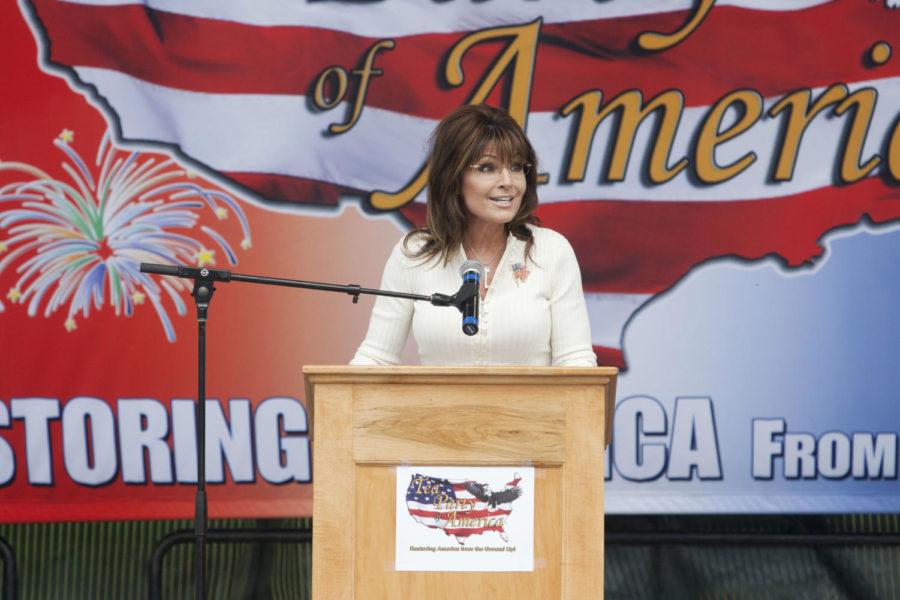GOP losing candidates, caucus dates unclear
Photo: Kelsey Kremer/Iowa State
Former Alaska Gov. Sarah Palin speaks to the crowd during the Tea Party of America’s Restoring America event on Saturday, Sept. 3, 2011 in Indianola. Despite the rain, many people came to the event specifically to hear Palin speak.
October 6, 2011
The GOP is trying to reorganize after Sarah Palin and Chris Christie announced they will not be running in the presidential election and caucuses will be starting sooner than expected after Nevada decided to move its caucus from February to January.
Dianne Bystrom, director of the Carrie Chapman Catt Center, reminds that with many debates and straw polls having already taken place in the past year, it is somewhat unreasonable to think a candidate would enter the race after September.
However, the decision of Christie, quickly followed by Palin, has left many members of the Republican party wondering why the candidates made the decisions they did, and what effect this may have on the caucus and primaries early next year.
Palin states in her letter to her supporters, released on ABC News, that ” … at this time I can be more effective in a decisive role to help elect other true public servants to office.”
Palin is a very media-oriented politician with more than 3.2 million Facebook friends and 670,000 followers on Twitter. Her lack of support by Republican organizations coupled with her large number of non-organizational supporters nationwide may have led her to decide that her place in politics is to influence the masses verses running for office.
“We can only speculate that her own assessment of the strength of her candidacy was not strong enough to run for Presidency, ” said Steve Armstrong, chairman of the Linn County GOP.
While both candidates are strong in the media, Christie’s decision not to run may have been more based on his lack of experience in the political realm.
The two-year governor of New Jersey possibly felt he had too many responsibilities to his state and didn’t want to leave the job unfinished. While Christie had a significant amount of encouragement by Republican organizations to run for office, the ultimate deciding factor may be that the he simply did not have enough support from grass-roots Republicans.
That is especially true in Iowa, where the caucuses make individual voting appeal so important. While Christie’s official decision not to run is influential in the GOP, Ryan Gough, organizational director for the Republican Party of Iowa, said, “As far as Iowa is concerned, you don’t have to pay a fee or have a time you need to declare by. You just need to build an organization and get people to the caucuses.”
It would be nearly impossible for Christie to gain enough support this late in the game.
Scheduling issues with the upcoming caucuses and primary elections may have added additional pressure for the candidates, especially Christie.
After Florida announced its primary would take place Jan. 31, additional pressure was put on other states to follow suit.
South Carolina recently dated its primary as Jan. 21, and just Wednesday, Nevada announced its date to be Jan. 14. The light is now focused on Iowa and New Hampshire to fill in the schedule. In the past, Iowa has had the first caucus on Feb. 6, but if Iowa wants to remain the front-runner in deciding the presidential candidate, the caucus may be scheduled for as early as Dec. 31.
In a recent news release, Republican Party of Iowa Chairman Matthew Strawn said, “Regarding the timing of the ‘First in the Nation’ Iowa caucuses, Iowa will remain first. Consistent with tradition, the final Iowa caucus date will be announced once New Hampshire sets the date of its ‘First in the Nation’ primary.”
So what does this mean for the GOP? In effect, it might mean a greater representation of the Republican Party.
The candidates running are now able to become much more focused and precise on exactly what the issues are at hand and how their presidency would help suppress the concerns of the American people.
“It’s going to settle down the campaign. Now people need to seriously look at every one of the candidates and who is going to best move our message forward. I think you will see more people making their decision on candidates because the field is set,” said Trudy Caviness, state central committee member in the 2nd District.

















